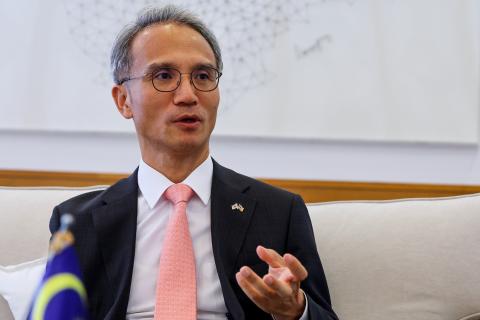By Nabilah Saleh
KUALA LUMPUR, Dec 27 (NNN-Bernama) — For 40 years, the Look East Policy (LEP) – which was initiated by Malaysia in 1983 – has continuously witnessed shared prosperity, technological innovation and cultural exchange not only with Japan, but also with South Korea.
South Korean Ambassador to Malaysia Yeo Seung Bae told Bernama’s International News Service it is crucial to note that LEP is still relevant for the next generation of leaders and citizens, both in Malaysia and South Korea.
In 2023, the ties with South Korea that reached its 63rd year witnessed a new level of vibrancy which undoubtedly could be further boosted with a concrete understanding through two definite avenues – elevation of ties to Strategic Partnership and a bilateral Free Trade Agreement (FTA).
With scheduled high-level diplomatic exchanges in the pipeline next year, Yeo is hopeful that both goals could be accomplished soonest possible.
“I have mentioned on various occasions throughout this year that LEP should be upgraded into a new Look East Again Policy (LEAP) for the next 40 years. LEAP signifies the intention to elevate the bilateral relationship to a higher level.
“If the past LEP led to cooperation in the economic and industrial sectors between South Korea and Malaysia, the 21st century challenges and opportunities require an upgrade in our relations – a Strategic Partnership.
“Discussions are in the final stages to draft a Joint Statement on it and an official announcement is expected next year. Through the Strategic Partnerships’ establishment, both countries will actively promote communication and collaboration in maintaining regional peace and stability.”
Yeo said this in an exclusive interview recently when asked about the year-long celebration which covered various LEP commemorative events celebrating the 40th anniversary of LEP organised by the embassy, reflecting the achievements and the current status of bilateral relations.
The LEP which he described as the powerful driving force behind the development of economic cooperation between the two countries has now evolved into industrial collaboration, and recently diversified into new areas such as green energy, digital technology, and even culture.
“LEP isn’t just about bonding at the national level, but it also involves connecting citizens through South Korean community activities in Malaysia,” he said.
Yeo further noted the LEP saw over 420 South Korean companies, including Samsung, SK, Lotte, POSCO, Hanwha, CJ Group and OCI Company Ltd contributing to Malaysia’s economic development and South Korea emerged as Malaysia’s eighth largest trading partner and seventh largest investment partner.
Spillover effects
Specifically on FTA, Yeo pointed out that the resumption of it could bring other spillover effects in the economic sector and he is positive about the progress on negotiations that has been made to date.
The envoy shared that despite possessing a highly attractive environment for foreign investment, Malaysia is relatively undervalued and less known to South Korean companies compared to Indonesia and Vietnam.
“However, in a survey conducted in 2023 targetting our companies operating in Malaysia, these companies gave the Malaysian investment environment a score of over 8 points out of 10, with over 36 per cent expressing intentions for new or expanded investments,” he said.
Thus, to foster more collaboration and investment between the two countries, efforts are needed to bridge the perception gap among these companies.
“The most effective approach is believed to be the resumption of bilateral FTA negotiations, which were halted in 2019.
“An FTA would not only reduce tariffs but also provide a stable economic cooperation platform for businesses in both countries, opening new opportunities. In particular, it could send a clear signal to South Korean companies that Malaysia is a trustworthy and promising investment destination.
“Fortunately, both governments are aware of the importance of resuming bilateral FTA negotiations and are currently in discussions. Swift resumption of these negotiations is eagerly anticipated,” Yeo added.
South Korea, which already has a separate FTA with the regional bloc ASEAN, has yet to conclude one with Malaysia ever since both nations commenced negotiations on the bilateral FTA in 2019.
According to the South Korean embassy in Malaysia, the bilateral trade volume for 2022 reached US$26.7 billion.
As of November 2023, the recorded volume stands at US$22.7 billion – a figure significantly higher than the approximately US$2.83 million recorded in 1965.
Malaysia is the third-largest trade partner of South Korea in Southeast Asia.
Robust defence cooperation
Meanwhile, truly believing in the high potential of defence industry cooperation between the two nations, Yeo highlighted he would want to build robust defence partnerships across all areas – land, sea, and air, especially during his stint here.
Appreciating the Malaysian government’s decision to choose the FA-50, the light combat aircraft as its strategic military asset, South Korea is committed to extending collaboration beyond the sale of the aircraft.
“Given Malaysia’s possession of advanced industrial infrastructure, there is significant potential for cooperation in the defence sector, which is a nexus of technology, strategy and resource management.
“Particularly the maritime cooperation, it can greatly benefit the relationship and foster Malaysia’s development as well.
“Transfer of technology and know-how from South Korea will contribute to enhancing local production capabilities and impacting Malaysia’s overall economy and industry. I firmly believe that a more extensive and profound partnership in this sector will follow,” he said.
In February this year, Malaysia picked South Korea’s FA-50 light combat jet as announced by the Korea Aerospace Industries (KAI).
The South Korean company said the contract worth US$920 million will see it deliver 18 FA-50 jets, with the first delivery due for 2026.
— NNN-BERNAMA






